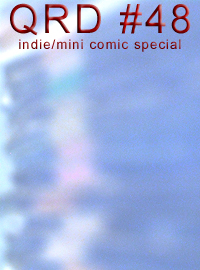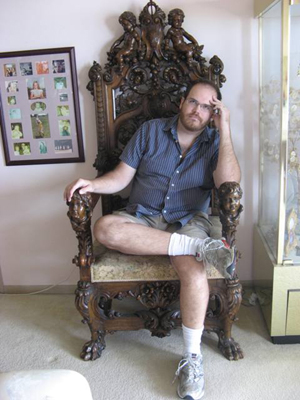









February 2011

City: New York City
Comics: Box Office Poison, Tricked, Too Cool to Be Forgotten
Websites: www.comicbookalex.com
QRD – How old were you when you first got into comics & did you always stick with them or did you come back to them?
Alex – I was much more into newspaper comics than comic books as a young child. Then I would read stuff like MAD & ARCHIE, but it wasn’t until I started reading superhero comics when I was about 11 or so that I really became a serious comic book reader. My tastes changed over the years, but I always read comics after that.
QRD – What was the first comic book you ever bought?
Alex – I don’t recall. Some ARCHIE title, most likely.
QRD – How old were you when you put out your first comic?
Alex – I was always drawing silly cartoons
& stuff to show my friends, but it wasn’t until I was about 12 or so
that I put together what would be called an actual comic book. It was a
superhero book called A.T.A.C. FORCE (American Team Against Crime).
QRD – What decade do you think produced
the best comics?
Alex – If you remove the nostalgia factor I don’t think it can be denied that the 2000s were the best. It’s kind of like television, in that I feel both media are really being allowed to be as intelligent as they like. If you allow for nostalgia I would say the ‘80s, since that was when I was most into superhero comics, but most of them wouldn’t hold up today.
QRD – Why comics instead of just writing or drawing?
Alex – I enjoy storytelling & drawing & comics is one of the few media where one person can do it all. It’s really suited to auterism, which suits me fine since I don’t like taking orders from The Man.
QRD – Do you see mini-comics & indie comics as paths to mainstream comics or as their own unique media?
Alex – I’m assuming you’re using “mainstream” to mean “superhero” comics. Personally, every time I’ve done a mini it was sort of as a temporary format until it was published “for real” in a book with a spine. I think mini-comics are a valid format, but as someone who loves putting books on shelves it’s always been a bit of an odd format.
QRD – How many copies of your comic do you print in your first run?
Alex – My first “for real” comic was the
Antarctic Press edition of BOX OFFICE POISON, & they probably printed
around 5,000 which was low at the time. My first mini probably had a first
printing of 30 copies!
QRD – How much do you think comics should
cost?
Alex – I really can’t come up with any blanket price, since there are so many different formats. I do think the high price of comics is one of the things slowly choking superhero comics to death; but I don’t really know what they can do about it, since I’m sure they’d price them cheaper if it was economically viable.
QRD – How many books do you produce a year & how many would you like to?
Alex – Let’s see: I started drawing comics in 1994 & have come out with about three graphic novels. So what is that? 33% of book a year?
QRD – Do you think stories should be serialized or delivered as complete works?
Alex – It really depends on what suits the story. I generally favor reading books that are done in a single volume, but there is a pleasure to reading something as it comes out, like FABLES or THE WALKING DEAD. I’m probably going to serialize my new story, if only on the interwebs.
QRD – How are comic strips different than comic books & which medium do you prefer?
Alex – I’ve never done a comic strip, but I imagine it’s exhausting. Between coming up with gags & the format restrictions I doubt I could do it. I guess that really only applies to strips that run in the newspaper, since with webcomics anything goes. I can’t imagine being a young cartoonist & wanting to go into newspaper strips, since it seems like the writing is on the wall for that once beloved medium.
QRD – How long is it from when you start a comic until it’s printed?
Alex – Usually years! Part of the reason I want to serialize is to get more of an immediate reaction from people.
QRD – What do you better with your comics now than when you first started?
Alex – I think I’m more confident with my linework. It’s just kind of cleaner.
QRD – At what point in the artistic process do you work digitally?
Alex – The only time I use the computer is when I scan them for publication. Other than that I’m really old school, using pen, inks, erasers, etc. My finished pages look pretty much exactly how they’ll appear in the book - ideally!
QRD – What do you think of digital comics & webcomics?
Alex – I think it’s exciting in that the potential is limitless. I don’t read too many of them to be honest, since I tend to like stories over gags, but there’s some good stuff out there.
QRD – Do you prefer working in color or black & white?
Alex – Virtually everything I’ve done has been in black & white. This is partially because of economics - almost no alternative comics publisher could afford to do a 600 page full color comic - but also because I’m totally clueless when it comes to using the computer to color.
QRD – How many different people should work on a comic & what should their jobs be?
Alex – Nine. I would write it & draw the figures & the other eight guys would do the rest: backgrounds, lettering, coloring, etc.
QRD – How do you find collaborators?
Alex – I adapted L. Frank Baum’s short story “A Kidnapped Santa Claus” into a graphic novella; I wouldn’t really call that a collaboration. He never even told me if he liked it or not, but maybe I should interpret his silence as a no. I’m intrigued at the idea of working with collaborators, but so far it hasn’t happened very much. I’m too egotistical.
QRD – How tight do you think a script should be as far as telling the artist what to draw?
Alex – I think it really depends on whatever the people involved want. The one time I did draw a story from someone else’s tight script I did find myself chafing a bit, but that was because he asked me to draw cars & other stuff I’m very bad at drawing.
QRD – What comic book person would you be most flattered to be compared to?
Alex – I suppose Tony Stark would be a
good one. He’s handsome & charming, right?
QRD – What do your friends & family
think of your comics?
Alex – Most of my friends tell me they like my stuff, but what else are they going to say? My wife & brother read my stuff, but other than that no one in my family has ever said anything either way. I’d be surprised if they actually read any of it.
QRD – What do you think of superheroes?
Alex – I think they’re fine, but I also think they’ve been done to death. It’s kind of a weird mix of telling the same stories over & over on one hand & trying to tell more serious stories while keeping the strongmen in tights. But every now & then I’ll still read a superhero comic I like.
QRD – Marvel or DC?
Alex – I mostly read Marvel when I was younger. I guess if I would do any book it would be FANTASTIC FOUR or SPIDER-MAN, so Marvel.
QRD – What comic characters other than your own would you like to work with?
Alex – I’m pretty much up for anything. If any superhero editor approached me about doing a book & I was given a lot of leeway as to what I could do, I think it would be interesting & fun - for me at least!
QRD – Ideally would you self-publish?
Alex – No. I really don’t have the patience or aptitude for the things self-publishing requires. All that business stuff? Ugh.
QRD – What conventions do you try to attend & why?
Alex – It’s strange but my favorites are sort of the medium sized shows like Heroes in North Carolina or the Pittsburgh Comicon. The super-sized shows like San Diego or New York can be really stressful & I always feel weirdly out of place at the cooler indy shows like SPX or MoCCA, but I think that probably has more to do with my own neuroses than anything that actually happens at those shows.
QRD – What do you do to promote your books?
Alex – When I do have a new book out I do as many shows as possible. I think with TOO COOL we probably did ten conventions that year, like a tour. I also try to have an internet presence, with my blog & the podcast I do with Mike Dawson, THE INK PANTHERS SHOW. I wish I was one of those people famous enough where they didn’t have to hype their stuff, but I’m not there. Yet?
QRD – Do you think your comics are well suited to comic shops or would sell better elsewhere?
Alex – I think my books are suited to well-run comics shops. I’ve heard from plenty of terrific retailers who tell me they like my stuff & try to push it on their customers. You can’t buy marketing like that & I always appreciate it. But most comic shops don’t carry my books, unfortunately.
QRD – What other medium would you like to see some of your comics made into (television, film, games, action figures, etc.)?
Alex – All of them! I was once a toy collecting nerd, so I think that would be a blast to see. I would love to see toy versions of my characters in some kind of collectible strategy game like Clix.
QRD – Do you consider yourself a comic collector or a comic reader or both?
Alex – Reader. I mostly buy graphic novels & they go on my bookshelves like all books should. When I was younger I did the whole collecting thing, keeping them all in bags with backing boards, the whole bit. Recently I sold my entire collection, about 2,000 comics, for about $75.
QRD – What do you see as the most viable mediums for comics distribution 10 years from now?
Alex – I’d like to see monthly floppies replaced by digital downloads, but the collections to still be sold in shops. Of course once the digital thing happens, I fear we’ll wind up like the music business & no one will want to pay for anything.
QRD – What would you like to see more people doing with comics?
Alex – I like good stories. My favorite comics do have some kind of complexity to them, something it would take you more than a few trips to the bathroom to read.
QRD – Anything else?
Alex – Nope.







